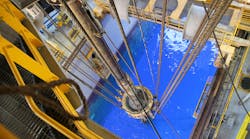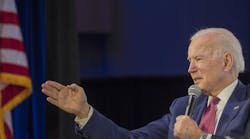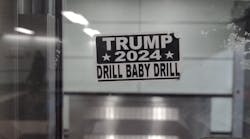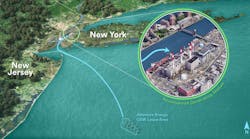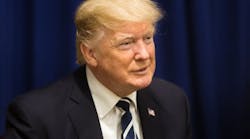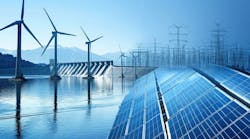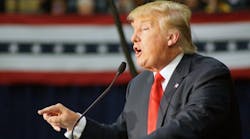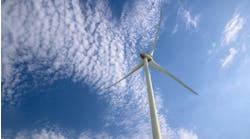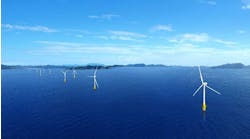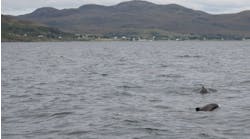By Bruce Beaubouef, Managing Editor
President Donald Trump is reportedly taking swift steps to halt offshore wind energy projects, assigning Representative Jeff Van Drew, a Republican from New Jersey, to draft an executive order targeting the industry.
Van Drew––a vocal critic of offshore wind––confirmed last week that he had spoken to Trump about the issue about a month ago, according to a Newsweek report.
The move signals Trump’s intent to pivot energy policy toward fossil fuels like oil, natural gas and coal, a cornerstone of his campaign platform.
The Biden administration had prioritized offshore wind as part of its climate strategy, setting aggressive targets to address global warming. However, Trump’s action could reverse the progress of an industry viewed as critical to reducing US greenhouse gas emissions, Newsweek opined.
Van Drew’s draft order, submitted to Trump’s nominee for interior secretary, Doug Burgum, calls for a temporary halt to offshore wind development to evaluate impacts on tourism, the fishing industry, marine ecosystems, and utility costs. While Burgum has yet to commit to the freeze, he signaled openness to reviewing existing projects during his Senate confirmation hearing.
The order aims to freeze wind development from Rhode Island to Virginia for six months, allowing a review of federal leasing and permitting processes.
Biden-era policies had sought to deploy 30 gigawatts of offshore wind by 2030. Under President Joe Biden, the Bureau of Ocean Energy Management approved 11 commercial-scale offshore wind projects, cumulatively expected to generate over 19 gigawatts of clean energy.
During his campaign, Trump criticized offshore wind turbines as unsightly and environmentally harmful, doubling down on claims––disputed in some scientific circles––that offshore wind activities threaten marine life, particularly whales.
During a press conference at Mar-a-Lago earlier this month, then President-elect Trump reportedly said that the US is “going to have a policy where no windmills are being built.”
Earlier, Burgum had been quoted to say: “I think President Trump’s been very clear in his statements that he’s concerned about the significant amount of tax incentives that have gone toward some forms of energy.”
Van Drew has said that he expects Trump to issue the executive order within the first quarter of the year, possibly on his first day in office. He said he views that as a first step toward an eventual moratorium on offshore wind development.
Election ripple effects
Meanwhile, some key suppliers in the US offshore wind supply chain market seem to be reading the tea leaves. In mid-January, the Prysmian Group announced that it was cancelling plans to build a proposed $300-million cable manufacturing plant at Brayton Point in Somerset, Massachusetts. Reporting by the Rhode Island Current said that the move had dealt “a major blow to offshore wind development on the East Coast as well as the economic prospects of the small South Coast town.”
The Prysmian Group spent nearly three years obtaining all the necessary state and local permits, including overcoming a regulatory challenge brought by a handful of neighbors of Brayton Point. But ultimately the company decided to walk away from the project just days before Donald Trump, who has vowed to shut down the offshore wind industry in the United States, took office.
Trump’s hardline stance on offshore wind is also reverberating in ongoing contract talks between Massachusetts utilities and two offshore wind developers – Avangrid and Ocean Winds. With Trump’s inauguration creating a great deal of uncertainty about the future of offshore wind, the two sides recently indicated that they needed more time to reach a deal. Instead of releasing the contracts in February, the deadline has now been pushed back to May.
The deteriorating situation is raising questions about the state’s efforts to make offshore wind the centerpiece of a climate change policy that hinges on electrifying homes and vehicles using carbon-free power. Massachusetts Governor Maura Healey declared her support for offshore wind in a procurement that concluded last September, but that strategy is now in jeopardy as Trump threatens to shut the industry down and impose tariffs on imported products and materials.
Prysmian did not mention Trump in a statement confirming its decision to not exercise an option to purchase land at Brayton Point. The company said that it was seeking to align its capacity to produce subsea cable with demand for its product.
Prysmian had initially signed a deal in 2022 to buy space at Brayton Point for its plant, a move that attracted the attention of President Biden, who came to Somerset to celebrate the community’s shift to renewable energy. “Brayton Point is on the frontier of clean energy in America,” Biden had proclaimed at the time.

